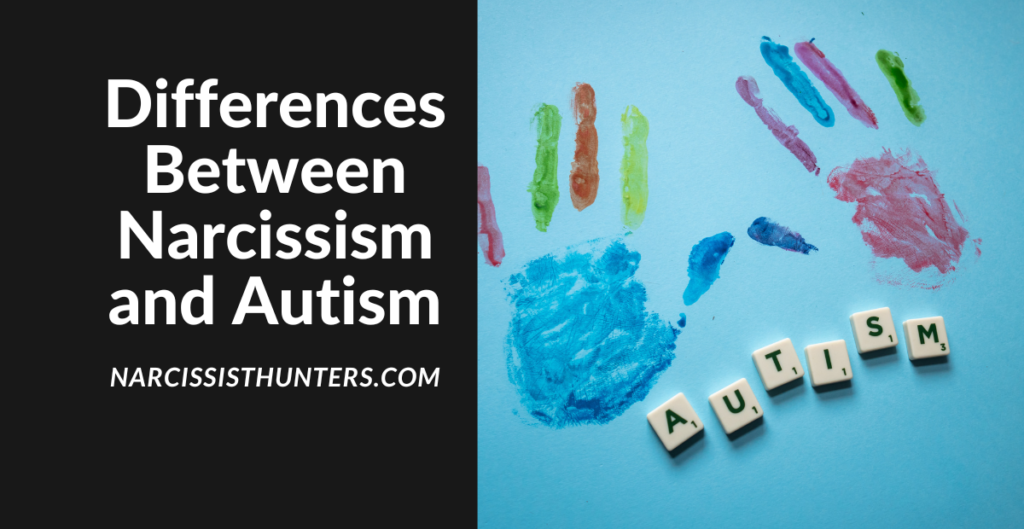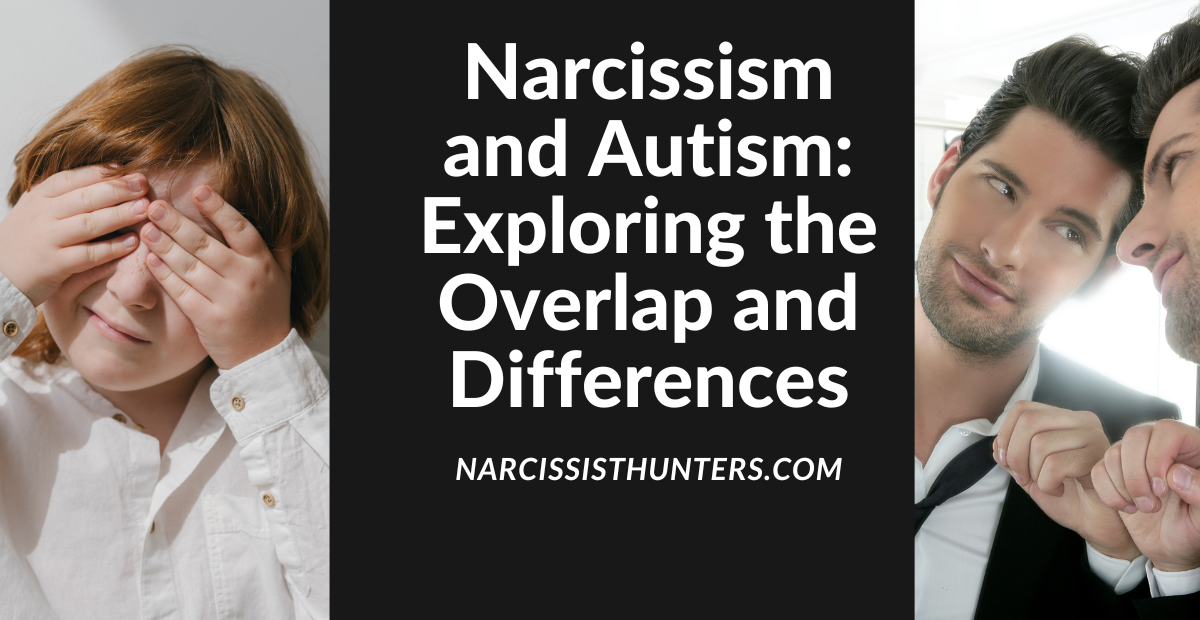Narcissism and autism are two distinct conditions that are often compared and contrasted due to their impact on social interaction and communication. While narcissism is often associated with a grandiose sense of self-importance and lack of empathy, autism is characterized by difficulties with social interaction and communication, and restricted interests or repetitive behaviors. In this blog post, we will explore the differences between narcissism and autism, as well as their overlap and treatment approaches.
Understanding Narcissism
Narcissism is a personality disorder that is characterized by a grandiose sense of self-importance, a need for admiration, and a lack of empathy for others. Individuals with narcissistic personality disorder (NPD) may have an inflated sense of their own abilities, achievements, and accomplishments, and may believe that they are entitled to special treatment. They may also have a tendency to exploit others for their own benefit and lack empathy for the feelings of others.
The diagnostic criteria for NPD include a pervasive pattern of grandiosity, a need for admiration, and a lack of empathy that begins in early adulthood and is present in a variety of contexts. The DSM-5 also notes that individuals with NPD may have an exaggerated sense of their own abilities and accomplishments, a preoccupation with fantasies of power, success, or attractiveness, and a tendency to take advantage of others in order to achieve their own goals.
Narcissism can have a significant impact on personal and professional relationships, as individuals with NPD may struggle to form meaningful connections with others. They may prioritize their own needs and desires over the needs of others, leading to a lack of empathy and difficulty maintaining long-term relationships.
Understanding Autism
Autism spectrum disorder (ASD) is a developmental disorder that is characterized by difficulties with social interaction and communication, and restricted interests or repetitive behaviors.
Individuals with ASD may struggle with nonverbal communication, such as maintaining eye contact or understanding social cues. They may also have difficulty with verbal communication, such as starting and maintaining conversations or understanding figurative language.
The diagnostic criteria for ASD include persistent deficits in social communication and interaction across multiple contexts, as well as restricted, repetitive patterns of behavior, interests, or activities. The DSM-5 also notes that individuals with ASD may have difficulty with social-emotional reciprocity, nonverbal communicative behaviors, and developing, maintaining, and understanding relationships.
ASD can have a significant impact on personal and professional relationships, as individuals with ASD may struggle to understand social norms and communicate effectively with others. They may also have restricted interests or repetitive behaviors that make it difficult to engage in typical social interactions.
The Differences Between Narcissism and Autism

Here are five differences between narcissism and autism:
1. Underlying Causes
Narcissism is believed to develop as a result of a combination of genetic and environmental factors, such as childhood trauma, inconsistent or overly critical parenting, or overindulgence. In contrast, autism is a neurodevelopmental disorder that is believed to have a strong genetic component.
2. Social Interaction
Individuals with narcissism may have a strong desire for attention, admiration, and praise, and may exhibit exaggerated self-importance and lack of empathy. On the other hand, individuals with autism may struggle with social interaction, communication, and empathy, and may exhibit difficulties in understanding social cues or expressing emotions.
3. Self-Image
Individuals with narcissism often have a grandiose self-image and believe that they are superior to others. They may also have an excessive need for validation and admiration from others. Individuals with autism, however, may struggle with understanding their own emotions and may have a more realistic view of their abilities and limitations.
3. Relationship Patterns
Individuals with narcissism often struggle with maintaining healthy relationships due to their lack of empathy and excessive need for validation and admiration. They may engage in manipulative or abusive behaviors to maintain control and power in relationships.
Individuals with autism, on the other hand, may struggle with forming and maintaining relationships due to their difficulties with social interaction and communication.
4. Treatment Approaches
Treatment for narcissism often focuses on developing empathy, reducing grandiosity, and improving social skills. This may involve individual therapy, group therapy, or support of medication to control symptoms.
Treatment for autism, on the other hand, focuses on improving communication, social interaction, and adaptive behaviors. This may involve behavioral therapy, speech therapy, or medication.
The Overlap Between Narcissism and Autism
While narcissism and autism are distinct conditions, there can be some overlap between the two. For example, individuals with narcissism may struggle with empathy or emotional regulation, which are also common traits in individuals with ASD. Additionally, individuals with ASD may exhibit rigid thinking patterns or become fixated on specific interests.
While individuals with autism may struggle with social interaction and communication, individuals with narcissism may struggle with empathy and emotional regulation. The two conditions also differ in terms of their underlying causes. Autism is believed to be a neurodevelopmental disorder that is present from birth, while narcissism is thought to develop as a result of environmental factors, childhood factors and genetics.
It is important to note that while individuals with narcissism or autism may share some similar traits, misdiagnosis or misperception of the two conditions can occur. For example, individuals with autism may be mistakenly viewed as arrogant or self-absorbed due to their difficulties with social interaction and communication, while individuals with narcissism may be misdiagnosed as having ASD due to their lack of empathy.
Treatment approaches for NPD and ASD also differ, with treatment for individuals with NPD often focusing on developing empathy and reducing grandiosity, while treatment for individuals with ASD may focus on improving communication and social skills. There is no known cure for either condition, but early intervention and appropriate treatment can help individuals with both conditions lead fulfilling and meaningful lives.
In conclusion, while narcissism and autism are often compared and contrasted, they are distinct conditions with different underlying causes, symptoms, and impacts on relationships. Accurate diagnosis and understanding of the differences between the two conditions is crucial for effective treatment and support. With the right resources and support, individuals with both conditions can live fulfilling and meaningful lives.
Final Thoughts
If you suspect that you or a loved one may be struggling with either narcissism or autism, it is important to seek professional help from a qualified mental health professional. A diagnosis can provide a clearer understanding of the underlying causes and symptoms of the condition, as well as provide access to appropriate treatment and support.
In addition to seeking professional help, it is also important to educate yourself on the condition and seek out resources and support. There are many online support groups, community organizations, and advocacy groups that provide resources and support for individuals with both narcissism and autism, as well as their families and caregivers.
Overall, while narcissism and autism may seem similar on the surface, they are distinct conditions with different underlying causes, symptoms, and impacts on relationships. It is important to understand the differences between the two conditions in order to provide effective treatment and support for those affected. With the right resources and support, individuals with both conditions can lead fulfilling and meaningful lives

no you are right i will write more